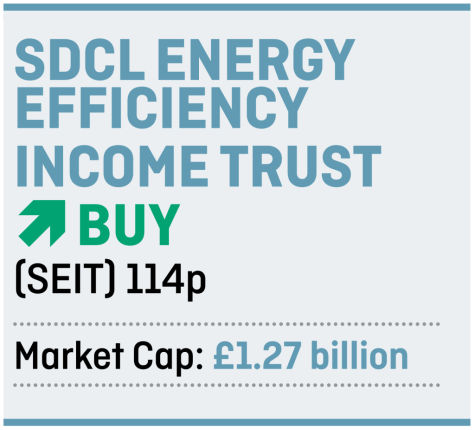Archived article
Please note that tax, investment, pension and ISA rules can change and the information and any views contained in this article may now be inaccurate.
This trust benefits from the race for businesses to be more energy efficient

Companies are under pressure to cut costs, which means energy saving measures are a priority discussion in the boardroom.
One of the quickest and easiest ways to reduce energy usage and carbon emissions is to be more efficient in the way energy is used in the first place.
While building new nuclear power stations and wind farms may help to limit global warming, building them takes many years and the payback must be measured in decades whereas saving energy today has an immediate impact.
The global market for energy efficiency is worth an estimated $300 billion per year, and SDCL Energy Efficiency Income Trust (SEIT) focuses on reducing energy costs, usage and wastage in buildings, which represent around 40% of total consumption.
Supplying energy directly to buildings at the point of use rather than from the grid reduces costs and wastage which occurs through transmission and improves energy security.
As well as investing in projects which provide cheap, clean, reliable onsite energy by installing solutions like cogeneration plants and solar arrays, SDCL Energy Efficiency invests in projects to reduce energy demand inside buildings through the installation of LED lighting, low-energy heating and ventilation systems and better insulation.
LED lighting is one way for firms to save money, yet many organisations have yet to make the switch. The NHS, for example, is still using old-fashioned lights across three quarters of its estate.
‘Energy efficiency has never been more valuable, it’s about getting the same level of output using less energy,’ says SDCL Energy Efficiency’s investment manager Jonathan Maxwell.
Demand for efficiency solutions had been increasing as decarbonisation became a priority for governments and companies and fossil fuel prices started to rise, but the invasion of Ukraine in March was ‘a watershed moment’ for the industry says Maxwell.
‘Energy prices have soared, and the structure of the UK and the European energy market has been challenged, so what was previously attractive has now become incredibly important given the high price environment,’ he adds.
Moreover, the invasion of Ukraine has been a wake-up call in terms of European energy security, driving more companies to look at installing onsite generation to become more resilient, which in turn is ‘a huge opportunity’ for SDCL Energy Efficiency.
In terms of income, the trust is targeting 6p in dividends for the year to March 2023, a 7% annual increase, which translates into a 5.3% yield. The ongoing charge is 1% and the shares trade on a 5.2% premium to net asset value.
Disclaimer: The author owns shares in SDCL Energy Efficiency Income Trust.
Important information:
These articles are provided by Shares magazine which is published by AJ Bell Media, a part of AJ Bell. Shares is not written by AJ Bell.
Shares is provided for your general information and use and is not a personal recommendation to invest. It is not intended to be relied upon by you in making or not making any investment decisions. The investments referred to in these articles will not be suitable for all investors. If in doubt please seek appropriate independent financial advice.
Investors acting on the information in these articles do so at their own risk and AJ Bell Media and its staff do not accept liability for losses suffered by investors as a result of their investment decisions.

 magazine
magazine








